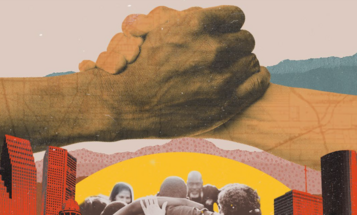
Hurricane Harvey Reminds Us the South Will Bear the Brunt of Climate Change in the U.S.
Climate change disproportionately harms people of color. People of color are overrepresented in the southern states.
Climate change means that the extreme weather events we are witnessing, like Hurricane Harvey and the heatwave currently sweeping southern California, will be more common and more intense. The level of flooding that Harvey has caused in Houston has traditionally been expected once every 500 years, but in fact “500-year floods” have happened 3 times in Houston in the last 3 years. The Washington Post suggested that 2016 be called “the year of the flood,” but Harvey alone has made 2017 the new “year of the flood.” The Post also noted that 2016 was an intense year for droughts and forest fires around the country. The future promises more natural disasters worsened by climate change as a result of inaction by those in power who deny climate reality.
In June, the New York Times produced an important map showing the predicted economic impact of climate change on counties across the United States. The map shows that counties in the southern states, from North Carolina across to California and southward, would carry the greatest economic costs of climate change. Many of the counties in these states could lose 5 to 15 percent of GDP per year, with the poorest counties suffering some of the largest declines.
While revealing the geographic inequity of climate change impacts in the U.S., one important point that these reports failed to highlight is that climate change will disproportionately harm people of color. People of color are overrepresented in the southern states, in the poorest counties, and among outdoor workers.
Latinos comprise a large proportion in these communities. Many Latino workers work outdoors in occupations such as landscaping, farming, and construction. The Times noted the toll that heat takes on people who work outdoors in southern states. It reported on a worker who “vomited and convulsed after hours of mowing lawns in stifling heat.” Latinos are already three times as likely as non-Latinos to die on the job from excessive heat. Climate change will put even more Latino workers at risk.
Hurricane Harvey, like its southern predecessors Rita and Katrina, already demonstrates that climate change will disrupt the lives of millions in the South, and will leave communities that have been historically marginalized more vulnerable to disaster. Harvey’s impacts are layered onto years of neglect of infrastructure, mapped onto racial lines, and exacerbated by the failure to plan for climate adaptation.
Addressing climate change will require not only reducing carbon emissions, but also investing in infrastructure, particularly in the communities most vulnerable to its impacts. Resilience to climate change calls for transforming the energy economy as well as building resilient neighborhoods through re-investment in communities of color and poor communities.



